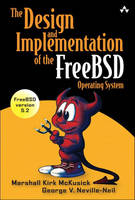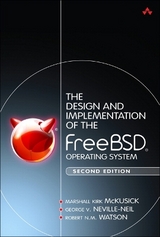
The Design and Implementation of the FreeBSD Operating System
Addison Wesley (Verlag)
978-0-201-70245-3 (ISBN)
- Titel gebraucht verfügbar
- Artikel merken
As in earlier Addison-Wesley books on the UNIX-based BSD operating system, Kirk McKusick and George Neville-Neil deliver here the most comprehensive, up-to-date, and authoritative technical information on the internal structure of open source FreeBSD. Readers involved in technical and sales support can learn the capabilities and limitations of the system; applications developers can learn effectively and efficiently how to interface to the system; system administrators can learn how to maintain, tune, and configure the system; and systems programmers can learn how to extend, enhance, and interface to the system.
The authors provide a concise overview of FreeBSD's design and implementation. Then, while explaining key design decisions, they detail the concepts, data structures, and algorithms used in implementing the systems facilities. As a result, readers can use this book as both a practical reference and an in-depth study of a contemporary, portable, open source operating system.
This book:
Details the many performance improvements in the virtual memory system
Describes the new symmetric multiprocessor support
Includes new sections on threads and their scheduling
Introduces the new jail facility to ease the hosting of multiple domains
Updates information on networking and interprocess communication
Already widely used for Internet services and firewalls, high-availability servers, and general timesharing systems, the lean quality of FreeBSD also suits the growing area of embedded systems. Unlike Linux, FreeBSD does not require users to publicize any changes they make to the source code.
Marshall Kirk McKusick writes books and articles, consults, and teaches classes on UNIX- and BSD-related subjects. While at the University of California at Berkeley, he implemented the 4.2BSD fast file system, and was the research computer scientist at the Berkeley Computer Systems Research Group (CSRG) overseeing the development and release of 4.3BSD and 4.4BSD. He has twice served as the president of the board of the Usenix Association. George V. Neville-Neil works on network and operating system code for fun and profit and teaches programming. He also serves on the editorial board of Queue magazine and is a member of the Usenix Association, ACM, and IEEE.
Preface.
About the Authors.
I. OVERVIEW.
1. History and Goals.
History of the UNIX System.
BSD and Other Systems.
The Transition of BSD to Open Source.
The FreeBSD Development Model.
References.
2. Design Overview of FreeBSD.
FreeBSD Facilities and the Kernel.
Kernel Organization.
Kernel Services.
Process Management.
Memory Management.
I/O System.
Devices.
Filesystems.
Network Filesystem.
Terminals.
Interprocess Communication.
Network Communication.
Network Implementation.
System Operation.
Exercises.
References.
3. Kernel Services.
Kernel Organization.
System Calls.
Traps and Interrupts.
Clock Interrupts.
Memory-Management Services.
Timing Services.
User, Group, and Other Identifiers.
Resource Services.
System-Operation Services.
Accounting.
Exercises.
References.
II. PROCESSES.
4. Process Management.
Introduction to Process Management.
Process State.
Context Switching.
Thread Scheduling.
Process Creation.
Process Termination.
Signals.
Process Groups and Sessions.
Jails.
Process Debugging.
Exercises.
References.
5. Memory Management.
Terminology.
Overview of the FreeBSD Virtual-Memory System.
Kernel Memory Management.
Per-Process Resources.
Shared Memory.
Creation of a New Process.
Execution of a File.
Process Manipulation of Its Address Space.
Termination of a Process.
The Pager Interface.
Paging.
Page Replacement.
Portability.
Exercises.
References.
III. I/O SYSTEM.
6. I/O System Overview.
I/O Mapping from User to Device.
Character Devices.
Disk Devices.
Descriptor Management and Services.
The Virtual-Filesystem Interface.
Filesystem-Independent Services.
Stackable Filesystems.
Exercises.
References.
7. Devices.
Device Overview.
The GEOM Layer.
The CAM Layer.
The ATA Layer.
Device Configuration.
Exercises.
References.
8. Local Filesystems.
Hierarchical Filesystem Management.
Structure of an Inode.
Naming.
Quotas.
File Locking.
Soft Updates.
Filesystem Snapshots.
The Local Filestore.
The Berkeley Fast Filesystem.
Exercises.
References.
9. The Network Filesystem.
History and Overview.
NFS Structure and Operation.
Techniques for Improving Performance.
Exercises.
References.
10. Terminal Handling.
Terminal-Processing Modes.
Line Disciplines.
User Interface.
The tty Structure.
Process Groups, Sessions, and Terminal Control.
C-lists.
RS-232 and Modem Control.
Terminal Operations.
Other Line Disciplines.
Exercises.
References.
IV. INTER PROCESS COMMUNICATION.
11. Interprocess Communication.
Interprocess-Communication Model.
Implementation Structure and Overview.
Memory Management.
Data Structures.
Connection Setup.
Data Transfer.
Socket Shutdown.
Local Interprocess-Communication.
Exercises.
References.
12. Network Communication.
Internal Structure.
Socket-to-Protocol Interface.
Protocol-Protocol Interface.
Interface Between Protocol and Network Interface.
Routing.
Buffering and Congestion Control.
Raw Sockets.
Additional Network-Subsystem Topics.
Exercises.
References.
13. Network Protocols.
IPv4 Network Protocols.
User Datagram Protocol (UDP).
Internet Protocol (IP).
Transmission Control Protocol (TCP).
TCP Algorithms.
TCP Input Processing.
TCP Output Processing.
Internet Control Message Protocol (ICMP).
IPv6.
1Security.
Exercises.
References.
V. SYSTEM OPERATION.
14. Startup and Shutdown.
Overview.
Bootstrapping.
Kernel Initialization.
Kernel Module Initialization.
User-Level Initialization.
System Operation.
Exercises.
References.
Glossary.
Index.
| Erscheint lt. Verlag | 9.9.2004 |
|---|---|
| Verlagsort | Boston |
| Sprache | englisch |
| Maße | 166 x 237 mm |
| Gewicht | 1190 g |
| Themenwelt | Informatik ► Betriebssysteme / Server ► Unix / Linux |
| ISBN-10 | 0-201-70245-2 / 0201702452 |
| ISBN-13 | 978-0-201-70245-3 / 9780201702453 |
| Zustand | Neuware |
| Haben Sie eine Frage zum Produkt? |
aus dem Bereich




